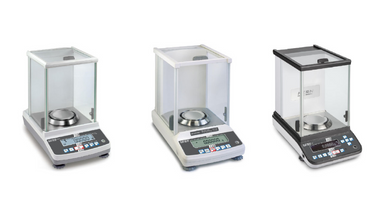5 important features to consider while choosing analytical balances
Analytical balance is a type of instrument used in laboratories that is designed to accurately measure the mass of samples and sediment. They have higher accuracy than other types of scales and can have readability as high as 0.01 mg. There is a variety of choices in the market and their prices can vary significantly. Therefore, it’s important to consider some key features that might determine the best fit for you. Having had a lot of experience with helping our clients chose the best product for them, we have made a short list that includes 5 important features that you should definitely consider while choosing analytical balances.
1. Balance readability
Readability determines the smallest increment of weight that can be displayed and accurately measured by the balance. If you have balances that offer a 0.1 mg readability, that means that you can read the measurement of a sample as precisely as 0.0001 g. The readability of a balance is determined by its design, specifications, and the technology used in its construction. Higher precision balances typically have a smaller readability, allowing for more precise measurements. The readability of a balance is an important specification to consider when choosing a balance for specific weighing applications where accuracy and precision are critical. It's worth noting that readability should not be confused with the capacity of a balance, which refers to the maximum weight that a balance can measure. Readability specifically relates to the smallest weight increment that can be accurately measured and displayed by the balance
2. Weighing range
Weighing range refers to the range of weights that can be measured by the balance – the minimum weight and the maximum weight. Correct weighting range ensures that the results are valid and accurate. Exceeding the weighing range of a balance can potentially damage the balance, affecting its accuracy and performance. Furthermore, the weighing range ensures that the balance can accurately measure weights within a specific range. If you exceed the upper limit of the weighing range, the balance may provide inaccurate readings or even be unable to measure the weight at all. It is important to use a balance with a suitable weighing range for the items being weighed to avoid overloading or straining the balance. Weighing range is an essential specification to consider when selecting a balance for a specific application.
3. Application
Application is one of the most important things to consider when choosing scales. Among the most common analytical balances application, there is sample preparation, density analysis, pipette testing, differential weighting, etc. Analytical scales that have application stated in their description will be easier to pick for those who don’t know the exact requirements for their scales - and only know what purpose they must serve. Scales designed for specific applications may incorporate specialized features and functionality tailored to the needs of that application. For example, laboratory scales may have built-in calibration functions or interfaces for data transfer, while retail scales may have pricing or barcode capabilities. Choosing a scale with the right features enhances efficiency, productivity, and convenience in the intended application.
4. Verification
When analytical balances are used for certain applications, they may require verification for being up to date and as accurate as they should be. Sadly, over time all measurement instruments may lose some accuracy and overall reliability. Certificates, such as metrological verification, DakkS certificate, etc. help verify that the scale is configured correctly and is ready for reliable measurement. Furthermore, many industries and applications are subject to regulations and legal requirements regarding weighing instruments. Using balances that have the necessary verifications and certificates ensures compliance with these regulations, avoiding potential legal issues or penalties.It is important to note, that certificates are usually ordered separately but they may be mentioned in the product description to show that the balances comply with the standards of said certificates.
5. Price
Finally, price is also very important to consider before buying analytical balances (or anything, really). It is important, because you may find the balances that do have everything you need but also have many features that you don’t care about. Having this in mind, you can look for the balances that are just enough for your needs – and the price should reflect that. The price should align with the specific application and weighing requirements. Consider the level of precision, capacity, weighing range, and other relevant specifications needed for your application. It's important to strike a balance between the price and the balance's ability to meet your specific needs. Overspending on features or capabilities that you don't require can be wasteful, while opting for a cheaper balance that falls short on essential requirements may lead to inadequate performance.
So, these are the 5 important features to consider before purchasing analytical balances. By taking product features into consideration, you can ensure that the chosen balance aligns with their specific needs and requirements. By taking important product features into consideration, consumers can make informed decisions, selecting balances that align with their needs, provide accurate and reliable measurements, are easy to use, durable, and backed by reputable support. This ultimately leads to a more satisfactory and successful weighing experience.

